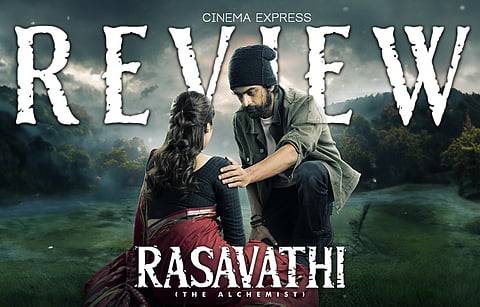Rasavathi Movie Review: An effective Arjun Das anchors this middling film with potential
Rasavathi(2.5 / 5)
Santhakumar’s latest film, Rasavathi, takes its name from the term alchemist, denoting someone who seeks to transmute base metal into gold, formulate the elixir of immortality, or create a cure-all medicine. In this case, the protagonist, Sadhasiva Pandian (played by Arjun Das), embodies the third aspect as a Siddha doctor crafting remedies for various ailments. However, as the narrative unfolds, it becomes evident that the title holds a more profound significance, symbolising the protagonist's personal metamorphosis. While Rasavathi presents an intriguing premise with uncommon characters and commendable performances, its execution falls short due to pacing issues and writing inconsistencies, making it a middling affair.
Director: Santhakumar
Cast: Arjun Das, Tanya Ravichandran, Sujith Sankar, Reshma Venkatesh
When Arjun Das appears on screen, you half expect him to slit someone’s throat or deliver a jab to the nose. In Rasavathi, too, the actor indulges in quite a bit of violence, but the offbeat nature of his character proves to be the film's most compelling element. Arjun's portrayal of Sadhasiva Pandian is characterised by sincerity and authenticity, and he effortlessly embodies the character's complexities and motivations. Sadhasiva is patient, issuing warnings before resorting to force. His sole purpose seems to be healing and protecting all living beings. Only towards the film's climax does Arjun erupt with intense emotions, drawing the audience into his character's turmoil. A sincere Arjun Das effortlessly steps into the shoes of Sadhasiva Pandian, his performance serving as the film’s cornerstone.
While it was doubtlessly refreshing to watch Arjun Das in a different avatar, the film’s pacing issues are undeniable, particularly with regard to establishing the central conflict. The film's slow-burn approach, with its deliberate character introductions and lengthy explanations from Sadhasiva, tests the audience's patience. The leisurely pace, particularly during the first half, feels like a trek through the Kodaikanal hills on a sluggish bike, leaving viewers yearning for a narrative boost. In a scene, Surya (Tanya Ravichandran) says that Sadha doesn’t look like someone who reads a lot of books because he doesn’t boast about it. But in reality, Sadha keeps spilling ‘Did you know?’ facts about Siddha medicine that seem to add little value to the overall scheme of things.
In Rasavathi, director Santhakumar aims to explore the conventional hero-villain dynamic, a departure from his previous works. From the outset, the film establishes clear distinctions between the hero and the villain. Despite this clarity, Santhakumar repeatedly emphasises the dichotomy between the two characters through parallel actions and dialogues. Sadha's compassionate deeds, such as saving a dying bird, stand in stark contrast to Parasuraj's (Sujith Sankar) cruel acts, like burning a rat alive. In a scene, both Sadha and Parasuraj deliver similar lines to Surya, eliciting contrasting reactions from her, further reinforcing their contrasting personas. While the film attempts to delve deeper into character development, the underlying traits of Sadhasiva and Parasuraj remain firmly rooted in black and white. Despite efforts to add complexity, the characters ultimately adhere to conventional archetypes, limiting the depth of their portrayal.
Sujith Sankar delivers a chilling portrayal of the sociopathic and sadistic Parasuraj. His characterisation transcends conventional writing and offers glimpses into Parasuraj's traumatic upbringing, marked by dysfunctional parents and domestic abuse. These elements add layers to his character, providing insight into his twisted psyche. However, despite the depth of his portrayal, certain aspects of Parasuraj's character remain puzzling. The film leaves questions unanswered regarding the psychological motivations behind his actions, including how he commits a mistake without remorse when that very mistake has caused his trauma.
Furthermore, secondary characters like Ramya Subramanian and GM Sundar appear in underutilised roles that mainly serve as narrative devices to propel the plot. The former is merely used for comic relief, and her scene with Sadha that motivates dialogue about film reviews seems forced. On the other hand, Sundar's impactful lines about righteousness arrive too late to leave a lasting impression. Such misplaced characters also seem to add to the lengthy tedium the film leaves us with.
Nevertheless, Rasavathi also has standout elements such as its background score and cinematography, which serve as the film's sturdy pillars. Thaman's score, particularly for the character of Parasuraj, is hauntingly effective, capturing his diabolical nature with brilliance. The song ‘Thai Thai,’ composed entirely with montages, possesses a catchy quality that has the potential to linger in the minds of audiences long after the film ends. Meanwhile, cinematographer Saravanan Ilavarasu's work transports viewers to the picturesque landscapes of Kodaikanal through his skilful framing. His use of light and shadows adds depth and atmosphere to key scenes, such as one where Parasuraj's shadow reflects his sinister nature as he expresses disdain for the happiness of others.
In the final act of the film, the pace picks up, drawing viewers to the edge of their seats as the reasons behind the protagonist-antagonist enmity are revealed. While the loose ends are ultimately tied up, the journey to reach this climax feels laborious. Ultimately, its flaws prevent it from achieving its full potential or offering the transformative experience promised by its alchemical title.

